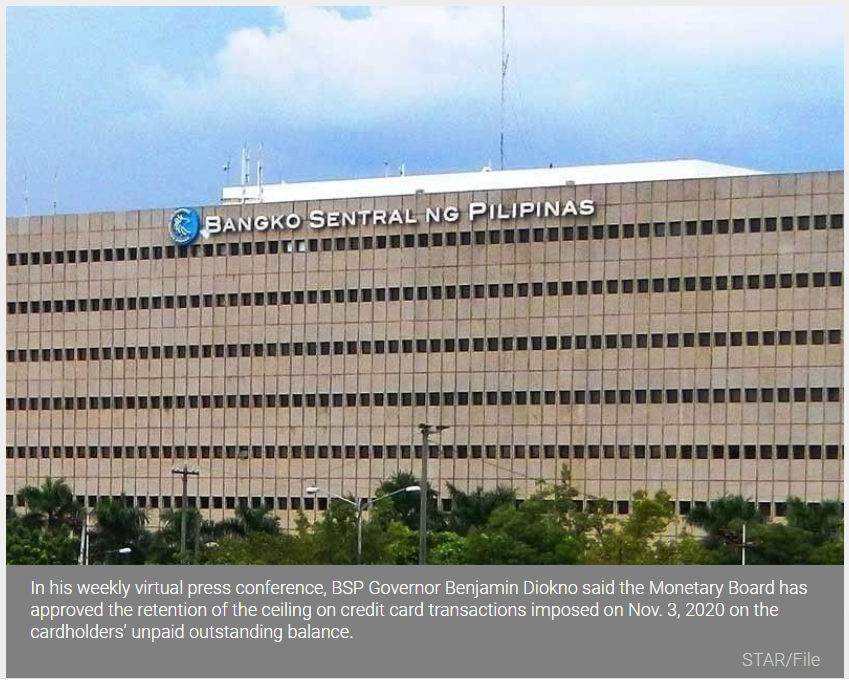Philippines: BSP retains cap on credit card interest charges
MANILA, Philippines — The Bangko Sentral ng Pilipinas (BSP) has retained the cap on interest rates on all credit card retail purchases and cash advances at 24 percent per year or two percent per month amid the low interest regime to help the economy recover from the pandemic-induced recession.
In his weekly virtual press conference, BSP Governor Benjamin Diokno said the Monetary Board has approved the retention of the ceiling on credit card transactions imposed on Nov. 3, 2020 on the cardholders’ unpaid outstanding balance.
“The retention of the ceilings is in keeping with the low interest rate environment,” Diokno said.
The BSP slashed interest rates by 200 basis points last year, bringing the overnight reverse repurchase rate to an all-time low of two percent to cushion the impact of the pandemic on the economy.
Diokno said the maximum one percent per month interest rate on loan-type credit card transactions or installment loans was also retained.
The regulator also maintained the maximum processing fee of P200 per transaction for credit card cash advances.
“The BSP will continue to closely monitor the impact of the ceilings on credit card financing and sustainability of credit card operations of credit card issuers especially on the backdrop of the evolving COVID-19 pandemic,” Diokno said.
On Nov. 3, 2020, the cap imposed on all credit card transactions took effect to ease the financial burden of consumers and companies severely affected by the COVID-19 pandemic.
The maximum rates and fees are subject to review by the BSP every six months.
“So we do this every six months and we review whether the cap is appropriate, whether it is to be increased or decreased as the case may be,” Diokno told reporters.
Prior to the imposition of the cap, the annualized interest rate on credit card receivables averaged 36 percent.
Latest data from the BSP showed credit card loans dropped by 9.6 percent to P405.28 billion in end-February amid the rising default by borrowers affected by the COVID-19 pandemic. The industry’s total loan disbursements shrank for the third straight month to 2.7 percent in February from 2.5 percent in January amid the tepid demand for loans while banks remained risk averse due to the uncertainties brought about by the global health crisis.
Meanwhile, Diokno said the implementation of the acquirer-based fee charging (ABFC) that took effect last Wednesday would help address the challenges in financial access, particularly the declining growth in ATM terminals and the limited availability of ATM terminals in the provinces.
While the National Capital Region and Region IV-A have 34 percent and 13 percent of ATMs in the country, respectively, the share of other regions ranges from zero to eight percent.
With ATM owners allowed to set the fees charged to ATM transaction, recover their cost and gain reasonable income, the ABFC can drive support for the deployment of ATMs in rural areas with no or few ATMs. This promotes financial inclusion.
Diokno said ATM withdrawals fell to 73.6 million in the first half of last year from 100 million in end-2019 but bounced back to 94.2 million in end 2020 as lockdown measures were relaxed.
For the first quarter , the BSP chief said ATM withdrawals declines anew.
Source: https://www.philstar.com/business/2021/04/09/2089813/bsp-retains-cap-credit-card-interest-charges


 English
English




